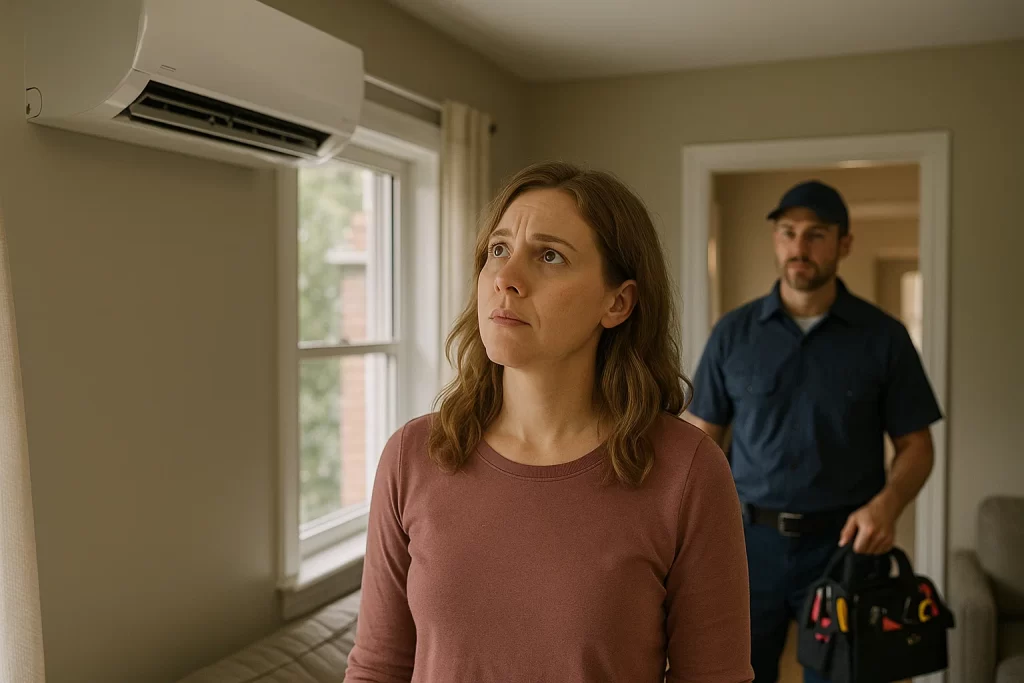Your air conditioner is supposed to keep you cool, not keep you up at night with strange noises. While some low-level humming or whooshing is perfectly normal, unusual sounds are often a warning sign that something is wrong. If your AC starts to rattle, squeal, or bang, don’t ignore it: these noises can be early indicators of mechanical issues that, if left unchecked, could lead to major repairs or total system failure.
Let’s break down some of the most common AC noises, what they might mean, and why it’s important to take action quickly.

1. Banging or Clanking
A loud banging or clanking sound usually points to a loose or broken part inside the compressor or fan assembly. Over time, bolts or screws can loosen, or internal components like the blower motor or fan blades may break or become misaligned. What it could mean:
- Loose or unbalanced fan blades
- Failing compressor
- Detached parts knocking around inside the unit
Why it matters: Ignoring this noise can lead to serious damage to your AC’s internal components, and those repairs can be expensive. A technician should inspect the unit right away.
2. Squealing or Screeching
High-pitched squealing typically indicates a problem with a belt or motor bearing. In older AC units, a worn or misaligned fan belt can cause squealing sounds. Newer systems might screech due to motor issues or lack of lubrication. What it could mean:
- Worn-out or slipping fan belt
- Motor bearings need oil or replacement
- High internal pressure in the compressor
Why it matters: Continuing to run your system without addressing this issue could result in total motor failure or damage to other moving parts. Fixing it early can prevent a full breakdown.
3. Buzzing
A persistent buzzing noise might not seem urgent, but it’s one of the most common indicators that your system is under stress. What it could mean:
- Electrical issues (faulty relay or loose wiring)
- Debris in the outdoor unit
- Loose parts vibrating
- Failing motor or capacitor
Why it matters: Buzzing can be a sign of electrical problems that pose both a safety risk and the potential for permanent AC damage. Don’t attempt to fix it yourself—call a licensed technician.
4. Clicking
A clicking sound when your system starts or stops is normal—but continuous clicking is not. If the noise doesn’t go away, it could be pointing to an issue in the electrical system or the control board. What it could mean:
- Malfunctioning thermostat
- Relay or capacitor failure
- Failing electrical components
Why it matters: Electrical issues can be complex and dangerous. Clicking could signal your system is struggling to start properly—something that will only get worse without intervention.
5. Hissing or Bubbling
These sounds often suggest a refrigerant leak or pressure imbalance inside the system. If you hear hissing, especially coming from the indoor unit or refrigerant lines, it’s time to call for help immediately. What it could mean:
- Refrigerant leak
- Leaking internal valve
- High internal pressure
Why it matters: Low refrigerant levels reduce cooling performance, strain the compressor, and can lead to complete system failure. Plus, refrigerant leaks can be harmful to the environment and must be handled professionally.
Contact Don’s AC Service, Inc. today to schedule an appointment for your HVAC and indoor air quality needs!
